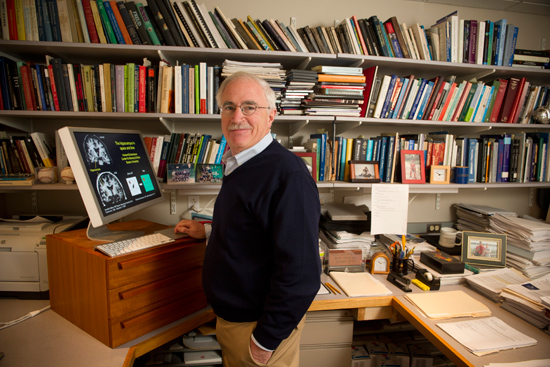CAS’s Eichenbaum Joins Ranks of Washington, Franklin, and Emerson
BU psychology professor elected to the American Academy of Arts & Sciences

Howard Eichenbaum’s brain studies have shown parallels between the inner mechanics of human and animal memory. Photo by Vernon Doucette
The key question, at least for Howard Eichenbaum’s son, was this: will it get you Red Sox tickets?
The query came on learning that his father had joined George Washington, Ben Franklin, and centuries of “thinkers and doers” who have been elected to the American Academy of Arts & Sciences. Eichenbaum, a College of Arts & Sciences professor of psychological and brain sciences and director of BU’s Center for Memory and Brain, will be inducted in October into the 235-year-old academy. Members contribute to its research and publications.
Eichenbaum has spent his career probing how the brain warehouses and summons memories. Being tapped for a group that also has included Ralph Waldo Emerson, Daniel Webster, and Martin Luther King, Jr. (GRS’55, Hon.’59) left him “stunned and, indeed, very honored.”
“I am mindful that my accomplishments are surely of interest to a more selective audience than those of the others” elected this year, he says. His fellow 2015 inductees include Tony Award–winning actors Audra McDonald and Christopher Plummer; singer-songwriter Judy Collins; Terry Gross, executive producer of National Public Radio’s Fresh Air; former Homeland Security director and current president of the University of California system Janet Napolitano; and lesser-known but leading figures in academia, the arts, business, journalism, government, and philanthropy.
His studies, Eichenbaum says, “have revealed memory abilities in animals that parallel those in humans, such as the distinction between conscious recollection of an experience as compared to mere familiarity for recently experienced events, and the ability to organize related memories and use memories to solve novel problems.” He has demonstrated that these abilities in both animals and humans depend on the part of the brain called the hippocampus. “I have characterized how memories are encoded and organized in the activity of neurons within the hippocampus, providing a preliminary understanding of the ‘memory code’ in the brain.”
“I believe these studies have provided insights into the nature of the memory code. I hope my findings turn out to be of importance for understanding how memory is challenged in aging and mental disorders, and of potential value for developing new treatments for memory disorders.”
His interest in the brain stems from a high school biology class that, despite teaching how the nervous system perceives visual stimuli and causes muscles to react, noted that the bridge between those two—thought—was little understood. “I was fascinated and began to search for ways to study how the brain ‘thinks,’ ” Eichenbaum says.
He earned a PhD from the University of Michigan and is editor-in-chief of the journal Hippocampus. In addition, he sits on the editorial board of 10 other journals and encyclopedias and is the author or coauthor of nine books and numerous research papers, reviews, and book chapters.
AAAS members from BU elected in previous years include University President Robert A. Brown; Dean of Arts & Sciences Virginia Sapiro; Leonid Levin, a CAS computer science professor; President Emeritus Aram Chobanian (Hon.’06); William Fairfield Warren Distinguished Professors James Collins, Nancy Kopell, and Laurence Kotlikoff; Kathryn Bard, a CAS archaeology professor; Nobel Laureate Sheldon Glashow, Arthur G. B. Metcalf Professor of Mathematics and Science; Jeffrey Henderson, William Goodwin Aurelio Professor of Greek Language and Literature; Ha Jin, a CAS professor of creative writing; Robert Pinsky a CAS professor of English; and Paula Fredriksen, a CAS professor emerita.
A list of this year’s electees may be found here.
Comments & Discussion
Boston University moderates comments to facilitate an informed, substantive, civil conversation. Abusive, profane, self-promotional, misleading, incoherent or off-topic comments will be rejected. Moderators are staffed during regular business hours (EST) and can only accept comments written in English. Statistics or facts must include a citation or a link to the citation.